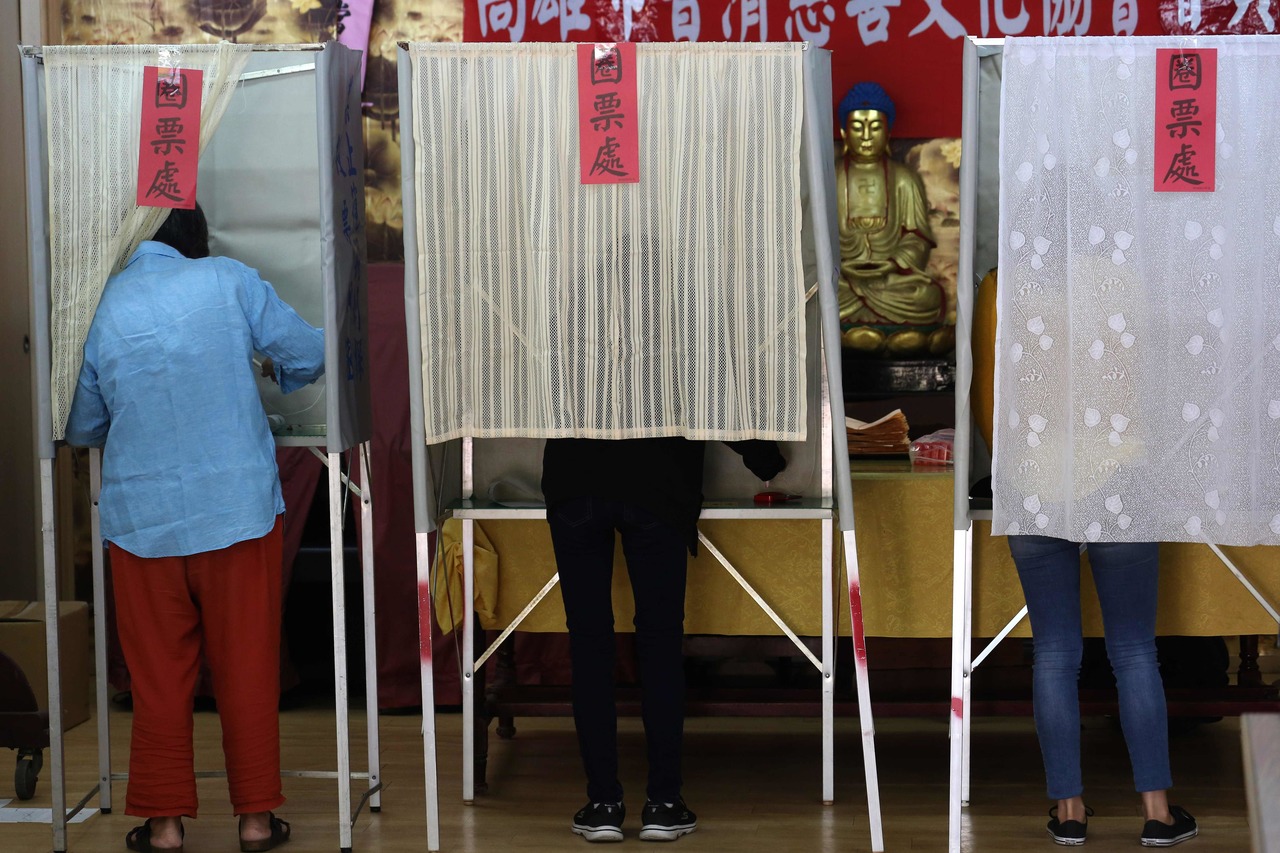China says election results will not change stance on Taiwan
Sign up now: Get insights on Asia's fast-moving developments

Residents vote at a polling station at Linyuan District in Kaohsiung, on Jan 11, 2020.
PHOTO: AFP
Follow topic:
BEIJING - A mainland Chinese official said on Wednesday (Jan 15) that the results of the elections in Taiwan will not change Beijing's position on Taiwan in spite of last weekend's overwhelming turnout in favour of pro-independence candidates, and swiftly condemned a new anti-interference legislation.
In its first post-election media briefing, China's Taiwan Affairs Office (TAO) of the State Council repeatedly said the results will not alter the reality that Taiwan is a part of China, even as the self-ruling island's president said hours earlier that the territory is "already independent".
"No matter what the outcome of the election in Taiwan, our policy on Taiwan will not change," said TAO spokesman Ma Xiaoguang. "No matter how the political situation in Taiwan changes, the peaceful development of cross-strait relations is still the voice and public opinion of the majority of Taiwan compatriots on the island."
"On the contrary, if cross-strait relations are damaged, the situation in the Taiwan Strait will be turbulent, and the interests and welfare of Taiwan compatriots will be damaged."
In a landslide victory seen as a rebuke of China and its bid for unification, Ms Tsai, who has been returned to power for a second term, claimed 57 per cent of the total votes, while her China-friendly rival drew just 39 per cent.
In a rebuke to pro-independence Ms Tsai, Mr Ma said there will be no space for any form of "separatist activities".
"We have a firm will, full confidence, and sufficient ability to thwart any form of Taiwan independence secessionist scheme. We will never allow any person, any organisation, any political party, at any time, or in any form, to split any piece of Chinese territory," he said.
Taiwan's "perverse actions" had also forced increasing calls within the mainland to retake the territory by force, he added.
Relations between China and Taiwan, which Beijing considers a renegade province to be retaken by force if necessary, have deteriorated since Ms Tsai first took office in 2016.
After she rejected the 1992 Consensus - an agreement that there is just one China - Beijing cut off official dialogue and sought to pressure Taiwan by poaching its diplomatic allies, ramping up military exercises and banning individual tourist travel to the island.
Mr Ma also condemned Taiwan's new anti-infiltration law, which took effect on Wednesday, making foreign interference in a Taiwanese election punishable by life imprisonment in serious offences.
"The Anti-Infiltration Act is an evil law that restricts the freedom of Taiwan compatriots and deprives them of their right to conduct cross-strait exchanges," he said, adding that while it may be harmful "for a while", it will not be able to stop cross-strait exchange.
"I don't believe that Taiwan compatriots have been pursuing democracy and freedom for many years, and will let such a bad law bind their hands and feet," Mr Ma said.
Despite slowing growth and a bid by the Tsai administration to lure Taiwanese manufacturers back home, mainland China is still Taiwan's biggest export market, with some US$207 billion (S$279 billion) of two-way trade in 2019.
Much of this is a direct result of former president Ma Ying-jeou's pro-Beijing government inking over 20 pacts with Beijing, including the Economic Cooperation Framework Agreement but further expansion of the agreement was halted after Ms Tsai took power.
The tensions across the Taiwan Straits are an accumulation of years of friction and normalisation of ties would be a long process, said cross-straits expert Chu Jingtao of the Chinese Academy of Social Sciences.
He added that more social and economic cooperation is necessary to maintain ties between both sides, especially with the Taiwanese youth.
"Because the DPP has a lot of propaganda on the island (Taiwan) which are detrimental to the mainland, Taiwanese people, especially the young, have some biases," he said.
With centre-periphery relations in a bad place, the TAO's message on Wednesday is an indication that not much would probably change in Beijing's interactions with Taiwan in the coming years, said Associate Professor Alfred Wu of the Lee Kuan Yew School of Public Policy in Singapore.
"(The Chinese) talk about wanting to be 'a family', but if you don't respect the outcome of the vote, how can you expect to be a family?" he said.

